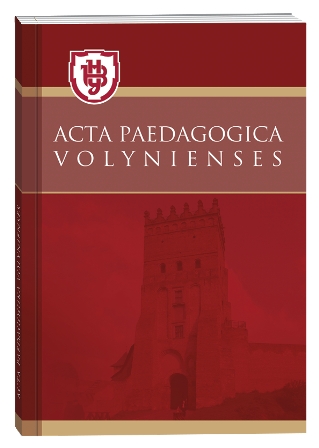THE KEY COMPONENTS OF COMMUNICATIVE COMPETENCE OF APPLICANTS FOR HIGHER EDUCATION
DOI:
https://doi.org/10.32782/apv/2021.5.18Keywords:
communicative competence, speech competence, applicants for higher education, components of communicative competence, components of communicative competenceAbstract
The article clarifies the meaning of the concept of “communicative competence”; it is emphasised that the communicative competence of applicant for higher education reflects the level of his spiritual and cultural development, forms worldviews and values for successful professional self-realisation. A review of the works of Ukrainian and foreign scholars on the problems of studying communicative competence has been carried out, the relevant aspects of research have been identified. The structure of communicative competence is established, within which linguistic, discursive, sociolinguistic, illocutionary, strategic, speech competences are distinguished. Attention is focused on the speech competence, which is defined as an integrated chыaracteristic of professional and personal qualities of the applicant. Speech competence consists of positive motivation, language knowledge, skills and abilities necessary for professional activity. The linguistic, socio-cultural, strategic and professional components of communicative competence are revealed. The language component is determined by the knowledge, skills, abilities, capabilities, due to which the applicant for higher education will build appropriate speech in accordance with the norms of grammar and vocabulary. The socio-cultural component covers background knowledge, in particular the socio-cultural features of the people, language, communicative behavior. The strategic component of communicative competence contains knowledge, skills and abilities that will help the graduate to carry out effective communication, apply the necessary communication strategies and tactics. The professional component contains abilities, qualities, knowledge, skills and abilities to search for professionally relevant information, determine the basics in professional texts, conduct presentations, surveys, etc. The key components of communicative competence of applicant for higher education are characterised: awareness in various communicative situations, ability to interact with the world around, ability to communicate with people, skills of constructive communication. It is determined that the communicative competence of an individual is the ability to establish and maintain contacts; it is a certain system of knowledge, skills, abilities, positions, thoughts and views, through which effective communication is carried out. It is noted that for the development of communicative competence of applicant for higher education it is necessary to develop communication management skills in modeling communication situations, performing special exercises, developing communication strategies and tactics, analysing expected results, predicting the behavior of communicators.
References
Атрощенко Т. Специфіка формування мовленнєвої компетентності майбутніх вихователів у світлі вимог Болонської конвенції. Науковий вісник Ужгородського національного університету. Серія «Педагогіка. Соціальна робота». 2011. Вип. 20. С. 11–13.
Вітюк В. Наукові основи формування правописної компетентності майбутніх учителів Нової української школи : монографія. Київ : Інтерсервіс, 2020. 416 с.
Кондратенко Н. Методика формування комунікативної компетентності майбутніх журналістів на засадах лінгвокультурології : дис. … канд. пед. наук : 13.00.02 «Теорія та методика навчання (українська мова)». Київ, 2018. 253 с.
Культура мовлення вчителя-словесника / О. Горошкіна, А. Нікітіна, Л. Попова, Л. Порохня, О. Рудіна. Луганськ : СПД Рєзніков В.С., 2007. 112 с.
Локарєва Г. Проблема формування у майбутніх журналістів культури професійного спілкування як ознаки комунікативної компетентності. Педагогіка формування творчої особистості у вищій і загальноосвітній школах. 2013. Вип. 30. С. 221–228.
Мамчур Л., Кучеренко І. Компетентнісна спрямованість ‒ пріоритетний напрям мовної освіти ХХІ століття. Філологічний часопис. 2015. Вип. 1. С. 168‒175.
Муханова О. Формування мовленнєвої компетенції студентів у професійно орієнтованому навчанні іноземним мовам. URL: http://www.rusnauka.com/12_KPSN_2014/Philologia/1_167648.doc.htm (дата звернення: 04.10.2021).
Нагорнюк Л. Формування іншомовної професійної комунікативної компетентності майбутніх журналістів у процесі фахової підготовки : автореф. дис. … канд. пед. наук : 13.00.04 «Теорія та методика професійної освіти». Тернопіль, 2009. 19 с.
Орап М. Мовленнєва компетентність і мовленнєва діяльність сучасної молоді. Освіта регіону. 2010. № 1. С. 84.
Селіванова О. Сучасна лінгвістика: термінологічна енциклопедія. Полтава : Довкілля-К, 2006. 716 с.
Словник-довідник з української лінгводидактики : навчальний посібник / ред.-упор. М. Пентилюк. Київ : Ленвіт, 2003. 149 с.
Шарапа М. Формування професійної комунікативної компетенції майбутніх журналістів. Соціум. Документ. Комунікація. Серія «Історичні науки». 2018. Вип. 5. С. 105–112.
Шидей Н. Комунікативна компетентність як складова журналістської майстерності. Молодий вчений. 2018. № 4.1(56.1). С. 94–97.







